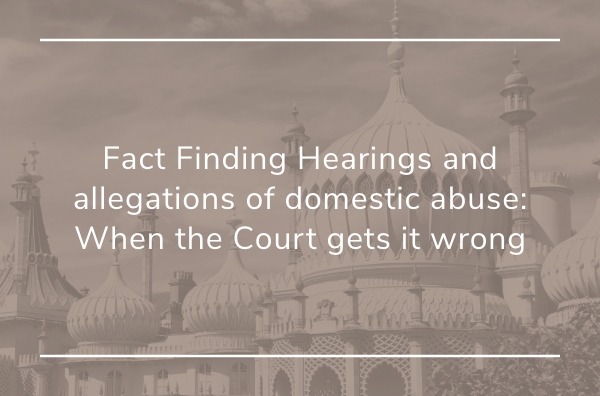
Over recent years there has, rightly, been a huge focus on ensuring that allegations of domestic abuse are properly tried within Children Act proceedings and that victims of domestic abuse are protected. The priority being to avoid further trauma through the litigation process, the Court conscious to ensure that proceedings are not used as a vehicle to perpetuate abuse and exert control over victims, under the guise of an application to spend time with children.
PD12 J provides comprehensive guidance about the circumstances in which it is necessary for there to be a fact-finding hearing, with a view to ensuring that any child arrangements orders are safe for the child and parent with whom they are living.
The Domestic Abuse Act 2021 identifies children as victims of domestic abuse in their own right, a concept long recognised by professionals working with children. The express prohibition of a victim being directly cross examined by their abuser finally puts the family courts on an equal footing with its criminal counterpart.
Part 3A FPR 2010 and PD3AA identify victims of domestic abuse as ‘vulnerable’, with a a duty on the Court to consider whether it is necessary to make participation directions.
Huge strides have been made, and the Court is, at least in my experience, getting it right. But in a recent fact-finding hearing before Tier 1 Judges, the Court’s failure to ensure that the alleged perpetrator had a fair opportunity to challenge the allegations against him, meant that the scales of justice tipped to the point of unfairness.
The Magistrates’ decision was successfully appealed to a Circuit Judge, the Court finding that the procedure adopted was procedurally wrong, leading to unfairness and the Father’s Article 6 rights to a fair trial being breached. The Father was, as is so often the case, a litigant in person.
So, what went wrong?
First, the Father had not been permitted to directly cross examine the Mother’s witnesses but was instead afforded a limited time to reduce his questions to writing in order that the bench could put these questions on his behalf. There had been no previous case management direction to this effect, there is nothing within PD 12J to allow such a course and there had been no application/ direction for special measures/ participation directions on behalf of those witnesses.
The Court refused to allow the Mother to be recalled in order that the Father could put further questions that he had prepared. Their reasons that recalling the Mother and ‘going against standard procedure would not be in the interests of justice’ were insufficient and the Magistrates’ had not considered the ‘overriding objective’ to ensure cases are dealt with justly.
Further, they concluded that ‘it was difficult to assess the Mother’s credibility’ but had failed to allow further questions by the Father or ask appropriate questions themselves. Within the Court’s ruling on this issue, it was emphasised that a fact-finding hearing is an inquisitorial process and the Magistrates’ ought to have asked appropriate questions of the Mother when her credibility was such a key factor in determining her allegations.
The Court’s assessment of the Father ‘barely exceeded one line in their reasons’. The Court found that the Magistrates had failed to provide sufficient reasons for finding that the Father was ‘not credible’, giving the appearance of an ‘arbitrary decision’ and which meant he would be unable to understand why that assessment had been made.
Whilst this case is the exception, it reaffirms the need to ensure that the rules are understood, followed and applied fairly as between the parties so that allegations of domestic abuse are properly tried.
In this case Jodie Cudworth of Westgate Chambers was instructed by Joshua Elliott-Noye of Barwells Solicitors on behalf of the client. Jodie will also be speaking about Fact Finding Hearings, the Courts approach to allegations of domestic abuse and application of PD 12J at GoodLaw Solicitors’ Private Children and Domestic Abuse panel event on Wednesday, March 1st.
If you’d like to book a ticket for this event, please contact Emma Taylor, a family partner at GoodLaw Solicitors.